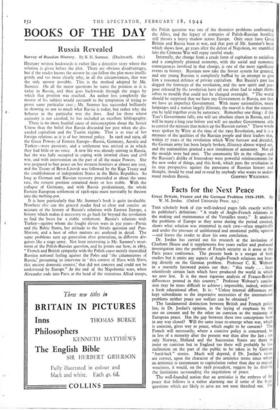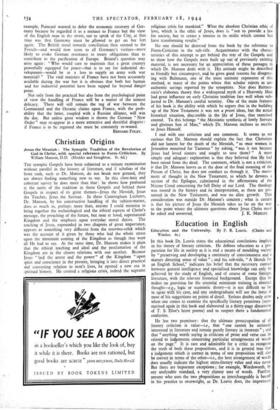Facts for the Next Peace
Great Britain, France and the German Problem 1918-1939. By W. M. Jordan. (Oxford University Press. iss.)
THIS scholarly book of 23o well-indexed pages falls exactly within its publisher's definition : "A study of Anglo-French relations in the making and maintenance of the Versailles treaty." It analyses the problems of Europe as they arose during the period covered, shows what solution was attempted in each case—often empiricall!, and under the pressure of uninformed and emotional public opinion —and leaves the reader to draw his own conclusion.
Dr. Jordan has carried out his research at the invitation of Chatham House and it supplements five years earlier and profound investigation into the problem of French security as it arose at the Paris peace conference. The present book is a merger of both studies but it omits any aspects of Anglo-French relations not bear- ing directly on the German problem. Professor C. K. Webster in a masterly foreword points out that : "this study . face, relentlessly certain facts which have produced the world in which we now live. It is the most rigorous analysis of Franco-British differences penned in this country." Professor Webstees conclu- sion may be more difficult to achieve ; impossible, indeed, without a fresh educational effort. It is : "Unless internal differences are kept subordinate to the imperative necessities of the international problems neither peace nor welfare can be obtained."
The fundamental distinction between British and French policy lies,- in Dr. Jordan's opinion, in the laying of emphasis by the one on consent and by the other on coercion as the mainstay ot European peace. Has the gap between these two conceptions been in any way closed? Will the same issue re-emerge when war, which is coercion, gives way to peace, which ought to be consent? The French will necessarily, where a coercive policy is concerned, be in less of a minority after the present war than after the last ; not only Norway, Holland and the Succession States are there to
insist on coercion but in England too there will probably be less inclination on the part of the public to be taken in by German
"hard-luck" stories. Much will depend, if Dr. Jordan's view,- are correct, upon the character of the armistice terms since where, an armistice is tantamount to capitulation rather than due to mutua weariness, it would, on the 1918 precedent, suggest by its draftw,' the limitations surrounding the negotiation of peace.
The well-founded notion that an armistice is the embryo of the peace that follows is a rather alarming one if some of the basl. questions which are likely to arise are not soon thrashed out. Fol‘
example, Poincare wanted to defer the economic recovery of Ger- many because he regarded it as a menace to France but the view of the English man in th.: street, not to speak of the City, at that time was that Germany must be pllowed to get on her feet again. The British trend towards conciliation then seemed to the French—and would now seem to all Germany's victims—more likely to evoke German resistance to treaty obligations than to contribute to the pacification of Europe. Briand's question may arise again : "Who would care to maintain that a great country powerfully equipped for peace—that is to say for industrial de- velopment—would be at a loss to supply an army with war material? " The vital statistics of France have not been accurately available during the war but it is obvious that both her human and her industrial potential have been sapped far beyond danger point.
Not only from the practical but also from the psychological point of view the handling of France will be a matter of the utmost delicacy. There will still remain the tug of war between the Continental and the Oceanic claims upon France, with the prob- ability that the latter, coupled with a Russian alliance, will win the day. But unless great wisdom is shown the German "New Order" may re-appear in a more attractive and deceitful disguise : if France is to be regained she must be constantly re-wooed.
BERNARD FOLEY.



























 Previous page
Previous page